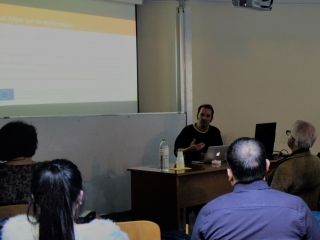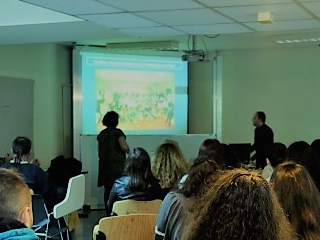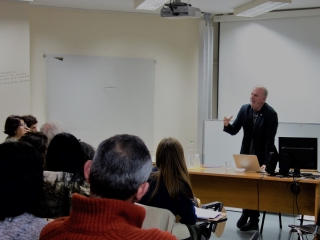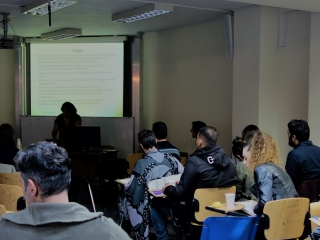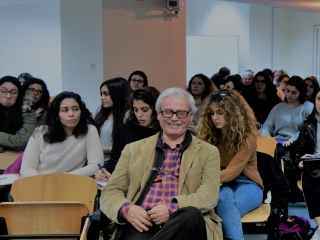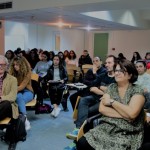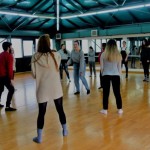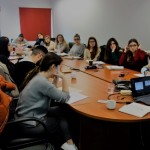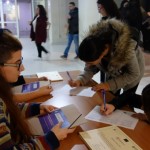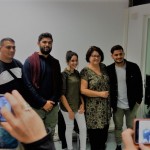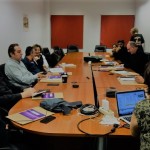Training of prospective teachers
- Written by Cospirom Administrator
- Published in Prospective Teachers
- Permalink
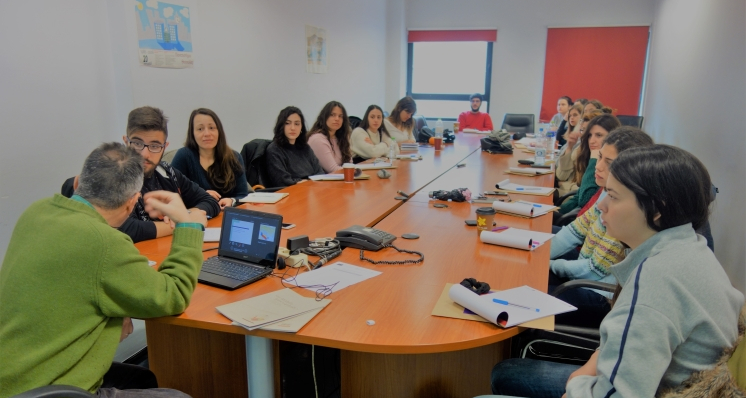
Mathematics literacy workshops
The purpose of the mathematics literacy workshops is, firstly, to help students realise that Mathematics is not a culture free knowledge and that students bring knowledge to the classroom that is culturally relevant. Therefore, students from cultural backgrounds other than the dominant, have different sources of mathematics knowledge. Utilizing this knowledge through appropriate classroom differentiations makes mathematics a meaningful learning object for these students.
Students will also be introduced to the perspective of adult mathematics literacy, as well as to the particularities of the educational context in correctional facilities.
1st ( 1st ) Workshop: Utilising Ethnomatics in Teaching Mathematics
Rapporteurs: Charoula Stathopoulou, Vaso Chrysikou
We will focus on exploring the relationship between daily practices and school teaching and learning, and the process of transforming everyday experience into school knowledge. Ethnomathematical ideas, as well as the notion of funds of knowledge will be used to shape the conceptual framework.
Experiential part – For this part, mathematical problems will be introduced (e.g, word problems with a scenario from everyday life) and students will be asked to deal with them, while being encouraged to develop informal strategies and suggest ways of managing them. Furthermore, they will be encouraged to suggest similar solutions dealing with problems in the framework of the common spaces of equal interaction with young Roma prisoners.
Objective: To help students understand the artificial distinction between formal and informal mathematical knowledge and to develop ‘bridging’ strategies in order to help the introduction of mathematical concepts and techniques to young prisoners, in meaningful contexts.
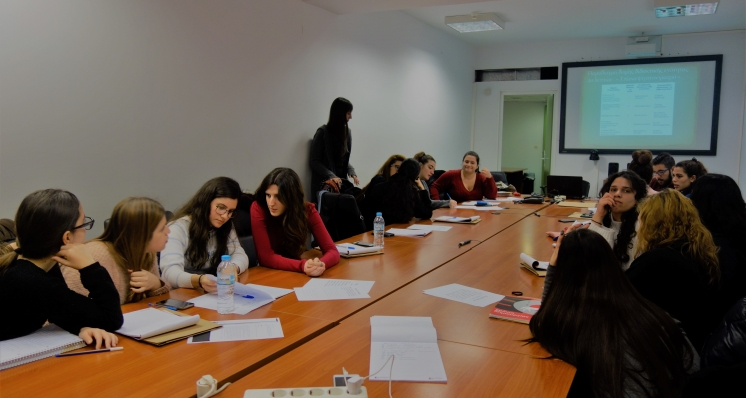
2nd ( 2nd ) Workshop: Getting to know the “prison world” and designing an interdisciplinary education project in maths for student prisoners.
Rapporteur: Ioannis Fovos
In this workshop, students will be introduced to:
– The prison environment and the challenges involved when provide educational services in such context
– Psycho-social and educational profile of student prisoners, the work of the teacher: issues / problems in teaching implementation,
– Good educational practices in correctional education,
-the implementation of a specific teaching intervention based on an interdisciplinary work plan.
In the Experiental part, they will be divided into groups and they will experiment in designing an interdisciplinary work plan in a mathematics module for student prisoners.
Objective: To get to know the conditions and environment within which a school operates inside a prison, the profile of student-inmates, and the characteristics that a teacher should have in order to be able to function in such an environment, so that they are prepared, as much as possible, before contacting the prison setting and the students, in order to plan a teaching intervention.
Intercultural Education Workshop
Objective
The workshop pursues a dual goal: (a) the understanding, by the participants, of the social processes that define the field within which the members of culturally ‘diverse’ groups constitute both their personal and social identities; and ( (b) the acquaintance with the fundamental principles of intercultural teaching and their use in shaping intercultural learning environments that contribute to the development of the identities of the target group’s subjects in an emancipation prospect.

3rd Workshop: The Processes of Hetero-Ethnicization and Self-Ethnicization as a Field of Identity’s making up – The Case of Roma Teenagers
Rapporteur: Christos Govaris
We will focus on analysing the social processes that define the field within which the ‘culturally diverse’ subject is constructed. We will refer in particular to the dynamics and tensions between hetero- and self-identification (hetero-ethnicization and self-ethnicization) in order to highlight socially mediated constraints in the formation of individual and socio-cultural identities of subjects who are categorised as members of ‘different’ groups, and thus diminishing dominant, essentialist perceptions of the identity of ‘others’.
Experiental part: Students will read and work out autobiographical texts of adolescents from minority groups. In these texts, adolescents refer directly or indirectly to the tensions that they themselves are called to manage and deal with in relation to the question of social belonging. Students will have the opportunity to understand the social components of identity formation and to formulate hypotheses about a learning environment that will be able to provide adolescents with constructive support through the task of transforming their personal and socio-cultural self-identification towards an emancipation perspective.
Language literacy workshops
Objective: Initially our goal is to raise awareness among students about issues related to language use, the relationship between languages and attitudes towards them and how they relate to (multi) literacy in general but also in relation to the profile of Roma students. We will then invite students to explore aspects of creativity in educational materials, as well as interventions and language games. Thus, in the third language cycle workshop they will experiment by creating their own material, applying the principles of adult education and a work-centric approach to learning and teaching.
4th (1st) Workshop: Sociolinguistic Aspects of Language Education
Rapporteur: Roula Kitsiou
Introductory seminar on basic sociolinguistics issues: languages in contact, language ideology and attitudes, bilingualism, literacy practices, multimodality
Experiential Part – Discussion in working groups on literacy practices in a local Roma community – Explorations of varied linguistic/multimodal texts they produce and their relations to local, translocal and global scales of literacy they sustain.
Objective: To raise awareness on language / language issues. Develop awareness of existing perceptions and attitudes of students towards languages, registers, (multi) literacy.
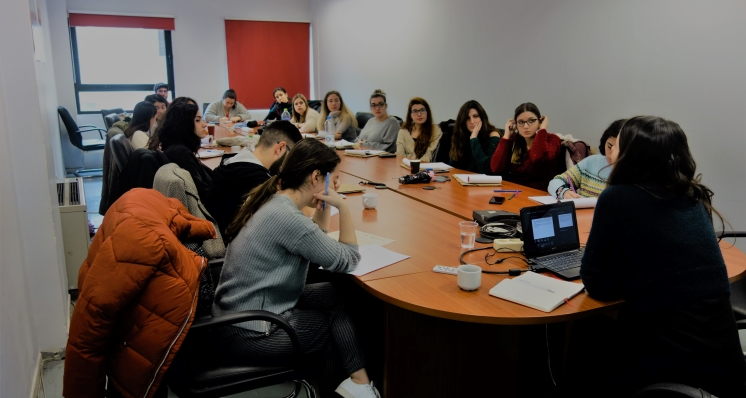
5th (2nd) Workshop: Creativity and Identity Texts
Rapporteur: Eleni Gana
Linguistic / semiotic communicative repertoires, “languaging” and identity texts as resources for learning and teaching processes. Examples of creativity in educational material, design and implementation of educational activities (interdisciplinarity)
Needs analysis and socio-linguistic profile of incarcerated learners and the learning barriers resulting from their imprisonment and institutionalisation.
Experiential part – create individual and group identity texts through varied verbal and non verbal representational modes – written, multimodal, digital (different types of materials are provided); reflect on their affordance for enhancing communication and participation in classroom communication;
Objective: Creativity, linguistics, and identity texts as tools to discover, reveal relationships with languages, and invest identities in learning,
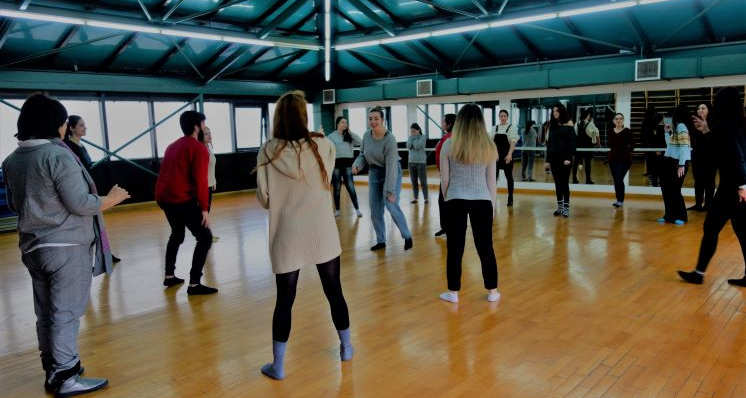
6th (3rd) Workshop: Work-centred approach to teaching and learning
Rapporteur: Sotiria Kalbeni
General principles of adult education (audiovisual material – video demonstration to identify the principles of adult education)
Critical Approaches to School Textbooks (How Can a Roma Adult coexist with such a textbook in elementary school?)
Presentation of the work-centred method
Experiential part- split into teams – build a task – design work-centred interventions
Objective: to move from theory to educational practice, students to develop skills in designing and developing educational material for the target audience
7th Workshop: ‘Escaping’ with Narratives: Utilising Narrative in Prisoner Education
Rapporteur: Kostas Magos
Objective: Through the workshop, participants will be introduced to the teaching technique of storytelling and the opportunities it offers when education processes address people from vulnerable social groups
Theoretical part: The theoretical part of the workshop will address issues related to the use of storytelling as a teaching technique and will feature examples from different applications in formal, informal and non formal educational contexts.
Experiential part: The trainees, working in smaller groups, will carry out their own narratives, which will then be elaborated using different techniques and in designing models for their exploitation in teaching processes.
Workshop on Dramatic Art Techniques in Linguistic and Mathematical Literature
Objective: The workshop will explore ways in which educational drama can be used as an alternative technique to promote mathematical and linguistic literacy in prison education. Students will become familiar with theatre as a tool for understanding concepts in mathematics and language, but also as a means of expression, creating and nurturing their social skills.
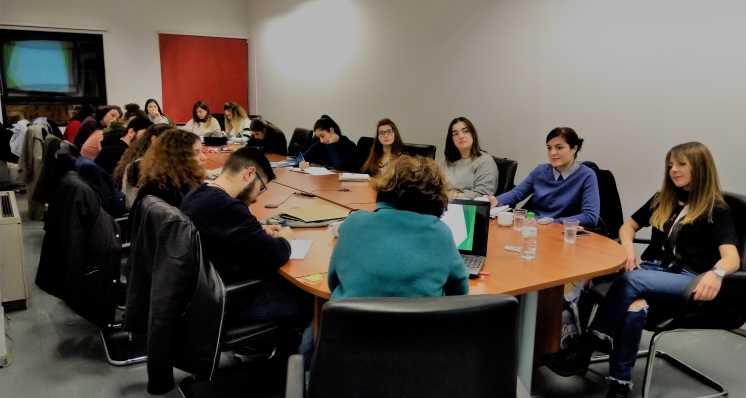
8th Workshop: Theatre as a tool for prison education and as a means of expression and creation’
Rapporteur: Maria Karazanou
Introduction to theatre as a tool in education and as an activity to promote reintegration. Theatre games and educational drama techniques, experiential approaches to prison education, creativity, role plays, forum theatre.
Experiential part – Students will work in groups and explore activities that can be used to enhance mathematical and linguistic literacy through educational drama. They will have the opportunity to suggest, devise and test activities with the team, enriching their practice and using the knowledge of previous seminars.
